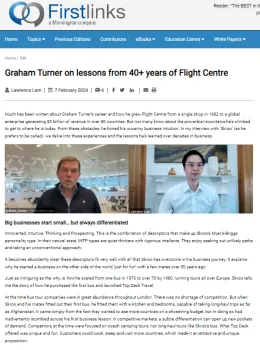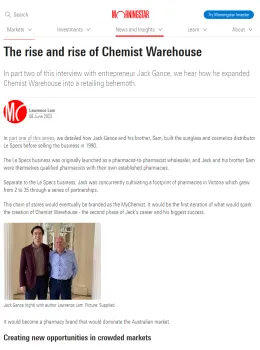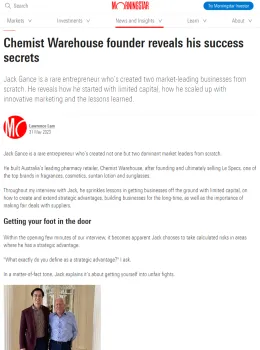First published in Firstlinks, 7 February 2024
This article is Part 2 of a three-part series about Graham Turner, Founder of Flight Centre.
***
Finding a Niche
Founders like Skroo always find a way to reinvent and adapt. Motivated by a return to Australia with his family, he looked to exit Topdeck but still had one eye on his next move. From his time in London, he noticed the travel market in Australia by comparison was relatively homogenous, controlled predominantly by big institutions who were happy selling exorbitant airfares with little competition. Skroo saw this environment as a ripe opportunity to build a niche – discount travel. He would have an edge sourcing flights from overseas airlines looking to offload tickets at the last minute given his connections in London.
The discount airfare retailers, known as bucket shops in London, was a concept not well known to Australia. At the time, airfare discounting was illegal, it was only a few years later that regulations would change and allow the market to open. As Skroo recalls, there were a few discount retailers who were prosecuted, but he was lucky to avoid this and flourish when the regulations were updated. He fondly remembers the deliberately handwriting messy promotions on shopfront blackboards as a tactic to attract the discount bargain hunters.
“Again we got into a niche that meant we could almost have as many customers as we wanted within reason” – Graham Turner
Taking the cash lessons from Topdeck, market entry was conservatively executed, preserving cash through the use of partnerships in the pursuit of an expansion strategy. When Flight Centre opened its first stores in Brisbane, Sydney and Melbourne, it did so via joint venture arrangements which minimised the amount of cash required. From those three domestic shops, they would eventually spread internationally not long after.

Graham Turner and Lawrence Lam
Going Global The Right Way
Global expansion has traditionally been difficult for many Australian companies. It was no different for Flight Centre. The difference maker was at Flight Centre, there was a group of co-founders at the helm determined to figure out and evolve their overseas operations. They also had the ability to make quick changes without heavy bureaucracy many other organisations face.
In 1989 the business opened its first overseas shops in London and California. Despite Skroo’s extensive experience in London, the shops struggled to gain traction. Skroo puts it down to two factors: timing and leadership talent. The expansion overseas was premature because in those days Flight Centre did not yet have the level of buying power it needed to acquire the cheapest possible airfares, meaning it could not offer the competitive pricing it needed to break into a new market. Its leadership talent was also quite thin which meant decision-making was made from afar in Australia; on the ground experience was lacking. The disappointing results led to the eventual closing of the London and Californian shops in 1991.
But unlike large corporates, Skroo’s operation was agile, could make quick decisions, and was determined to make the global expansion work. In 1995 they revisited the plan with a much stronger foundation. By then Flight Centre had just floated and had built up 350 shops in Australia, generating about $1 billion in revenues. With that also came a deeper talent pool of managers with greater skill and affinity to what Flight Centre was about – its corporate culture. The previous constraints which prevented a successful expansion were fixed. As Skroo puts it “this time we didn’t underestimate how difficult it was to start something up like that.”
Instead of hiring leaders overseas, Flight Centre sent, as Skroo put it “really good expats”, from Australia with a horizon of five to ten years to lead and grow the overseas operations. This tweak worked. It highlighted the importance of corporate culture and business acumen, which took years to develop. Eventually the expat would hand over to a local manager. Even today the formula for spotting internal talent has not changed – Skroo looks for those who make the right commercial judgements, reflect the corporate culture and are willing to relocate even with young families – “it is a big commitment and people prepared to make those commitments tells you something”.
It was with this approach that Skroo and his team would successfully expand into the UK and US throughout the 1990’s and would set Flight Centre on the path towards a true multinational business it is today.
***
For our other articles on founders, search ‘Founder interview’ in our Knowledge Bank





